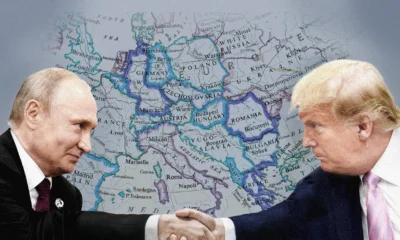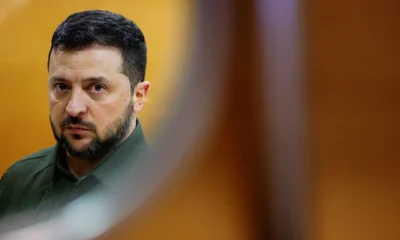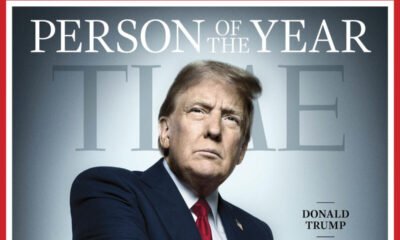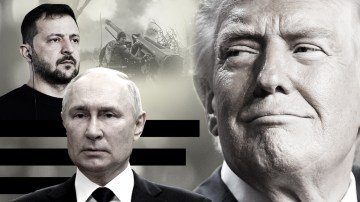Politics
Is AI Rigging German Elections? The Rise Of AfD, And How Young Voters Are Powering AfD’s Surge On Social Media
The rise of the far-right Alternative für Deutschland (AfD) among Germany’s young voters is a trend that could significantly impact national politics.
Published
1 year agoon

Germany is set to head to the polls on February 23, following the collapse of Chancellor Olaf Scholz’s coalition government in late 2024. The dissolution of the ruling alliance between the SPD, the Greens, and the Free Democratic Party (FDP) was triggered by disputes over Germany’s struggling economy.
Scholz dismissed Finance Minister Christian Lindner, accusing him of obstructing legislation and putting party politics above national interests. Lindner, in turn, claimed that Scholz was attempting to force him into violating the constitutionally enshrined debt brake, a move he refused to support. A failed confidence vote in December ultimately set the stage for snap elections.
The Rise of the AfD and Disinformation Campaigns
Beyond domestic political turmoil, a major concern in this election is the rise of the far-right Alternative for Germany (AfD), particularly among young voters. The party’s recent successes in regional elections indicate a shift from a regional to a national force, and it is gaining traction through sophisticated online campaigns, including AI-generated content and foreign interference.
Notably, experts have identified Russian-backed disinformation efforts targeting German voters, with groups like “Doppelganger” and “Storm-1516” spreading pro-AfD narratives. These campaigns employ AI to create deep-fake videos, fake TV news stories, and fabricated social media posts designed to discredit mainstream politicians and push far-right messaging. A notable example was an AI-generated video falsely accusing a pro-Ukraine German lawmaker of being a Russian spy.
Domestic Far-Right AI Campaigns
The use of AI-generated content is not limited to foreign actors. Within Germany, the far-right is also leveraging AI to spread propaganda.
One striking example is “Larissa Wagner,” an AI-generated influencer whose social media accounts push anti-immigrant rhetoric and promote AfD policies. While the creators behind Larissa remain unknown, her presence exemplifies how AI is being used to manipulate public discourse and amplify extremist narratives.
Reports show that the AfD itself has been the most aggressive political party in adopting generative AI, using it to create memes, music videos, and misinformation campaigns that glorify traditional German values while attacking migrants and political opponents.
One such campaign involved the “Remigration Song,” an AI-produced video advocating the mass deportation of immigrants, which was commissioned by the now-disbanded youth wing of the AfD. These homegrown efforts have been shown to significantly influence public opinion, as research by the Bertelsmann Foundation indicates that 80% of Germans view online disinformation as a major societal problem.

The Young Voters and the AfD Surge
The rise of the far-right Alternative für Deutschland (AfD) among Germany’s young voters is a trend that could significantly impact national politics. If last year’s European election results serve as an indicator—where there was an 18% increase in 16–34-year-olds voting for the AfD—the party’s ascent to second place in national elections appears increasingly likely.
The AfD’s influence is particularly pronounced in Thuringia, where the party is officially classified as an extremist organization by German domestic intelligence. Its leader, Björn Höcke, enjoys strong support among young voters, many of whom openly admire him.
For Example, take Dante Reidel, a 26-year-old student, who exemplifies this sentiment. Standing near a stall selling the German far-right magazine Compact, Reidel, himself designated an extremist, expressed deep admiration for Höcke. “It’s also about personalities… who embody certain values. And what I really appreciate about Höcke is that he is honest… and he speaks plainly.”
For many young AfD supporters, nationalism and historical nostalgia play a key role in shaping their political views. Reidel, for example, lauded “Prussian virtues” such as diligence and discipline, alongside cardinal virtues from antiquity, as central to his ideology.
The Young Alternatives, the AfD’s youth wing, has also been designated an extremist organization. In response, the group recently dissolved and restructured under central AfD control. However, its former leader, Engelhardt, dismissed accusations of extremism, calling them a conspiracy.
When asked why so many young Germans are turning to the AfD, Engelhardt echoed a party-wide narrative: “Migration is the mother of all crises. We have a lot of illegal immigrants in this country… who are not behaving. Many of the problems we have today are also caused by migration, by uncontrolled mass immigration.”
Recent violent incidents involving migrants have fueled these sentiments. A tragic car-ramming attack in Munich by an Afghan migrant left a 36-year-old woman and a 2-year-old child dead, marking the third such attack in recent months. Earlier, an Afghan migrant killed two in a knife attack in Aschaffenburg, while a car-ramming incident at a Christmas market in Magdeburg claimed six lives. These events have intensified public debates on migration policies.
The AfD’s proposed solution is “remigration”—a term with Nazi-era connotations. Engelhardt insists it is a “scientific term” and denies advocating mass deportations. However, AfD leader Alice Weidel stated in a January that if elected, she would immediately begin “sending out all the illegals.”
Despite accusations of extremism and close ties to radical elements, Engelhardt remains confident that young Germans will shape the country’s future. “Something has changed,” he claims. “The fact that many young people want to vote for the AfD means that we also have a future.”

Key Issues in the German Parliamentary Election
As Germany heads into a crucial parliamentary election, three major issues are dominating voter concerns—Ukraine, the economy, and migration. Each political party is positioning itself on these matters, shaping the discourse that will determine the country’s future.
One of the most pressing concerns is Germany’s role in the Ukraine war.
The government, led by Chancellor Olaf Scholz’s SPD, along with the CDU and the Greens, remains committed to providing military aid to Ukraine. Germany is currently the second-largest supporter of Ukraine’s war efforts after the United States, contributing approximately €7.1 billion in military assistance in 2024.
However, Scholz has taken a more cautious stance, balancing military aid with diplomatic efforts. In contrast, the far-right AfD and the left-wing BSW advocate for an end to arms supplies and a resumption of relations with Moscow. Despite political divisions, public sentiment largely favors continued support, with 67% of Germans backing military assistance, according to a ZDF poll.
The state of the economy is another defining issue, particularly the debate over Germany’s debt brake, a constitutional rule limiting government borrowing. Under current law, the state can only borrow up to 0.35% of its GDP, except in emergencies. The SPD and the Greens argue for reforming this policy to enable greater public spending and economic growth. CDU leader Friedrich Merz has expressed caution but remains open to discussions.
On the other hand, the AfD and the FDP strongly oppose relaxing borrowing limits, favoring fiscal restraint. The AfD has also proposed a radical economic shift—replacing the euro with the Deutschmark and even considering Germany’s exit from the European Union, signaling a significant departure from the country’s current economic trajectory.
Perhaps the most politically charged issue is migration and border control. Following a series of high-profile attacks involving migrants, immigration policies have come under intense scrutiny. The CDU is pushing for tighter border controls and restrictions on family reunification and naturalization for refugees.
The far-right AfD has taken an even more extreme position, advocating for closed borders and the complete removal of asylum seekers’ rights to family reunification. The SPD has adopted a dual approach—calling for stricter deportation measures for irregular migrants while simultaneously promoting the entry of skilled foreign workers.
The Greens remain the only party strongly defending an open-door asylum policy, emphasizing humanitarian aid, family reunification, and refugee integration. However, the recent attacks have led to a shift in political rhetoric, with even traditionally pro-immigration parties adopting a tougher stance.
The Last Bit
With election day approaching, Germany faces a critical test of its democratic resilience. Will AfD mark a new chapter in the book?
Meanwhile, the growing influence of AI-driven disinformation, both from foreign and domestic sources, are indicative of the evolving threats to political stability. Experts warn that while Russian campaigns aim to destabilize established parties, their effectiveness is amplified when adopted by domestic far-right groups.
As digital propaganda becomes more sophisticated, the challenge for German voters is to be able to steer through an increasingly manipulated information ecosystem while making informed choices at the ballot box.
You may like
-


Germany’s Friedrich Merz’s Big Balancing Act—Trump, Borders & Europe’s Future. Can He Deliver?
-


How It’s Not Trump But Vladimir Putin That Europe Is Stinging From: Trump’s U-Turn On Europe, Russia’s Strong Supply Chain—A Formidable Opponent!
-


Is Ukraine Now Stuck In The US-Russia Ecosystem? Could Zelensky Have Made A Deal To Stop The War, Is Trump Right?
-


Why Are Japanese Companies Not Happy With Trump? How Trump 2.0 Is Shaking The World Into A ‘Rude’ Awakening?
-


High-Stakes Peace Talks Ahead. Trump Team Leads, Zelenskyy Joins, But Ukraine Faces Tough Concessions—A Betrayal? Even As European Allies Watch In Disbelief
-


Trump’s Commendable Proposal. A Summit With Putin And Xi Jinping To Halve Military Budgets—Arms Reduction, Can It Happen?
